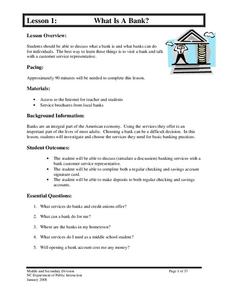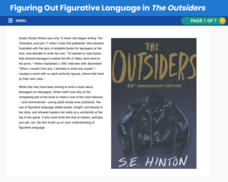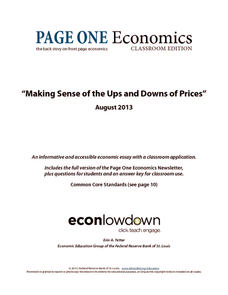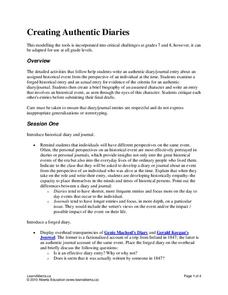North Carolina Department of Public Instruction
What Is A Bank?
You're never too young to learn about banking and personal finance. Use a set of seven banking lessons to teach middle schoolers about checking and savings accounts, interest rates, loans and credit cards, and safety deposit boxes.
Federal Reserve Bank
Money and Inflation: A Functional Relationship
What is the difference between money and bartering, and how is money valued when considering inflation? Delve into the correlation between these fundamental components of economics with this detailed resource, which consists of...
Federal Reserve Bank
Banking on Debit Cards
What are the advantages and disadvantages of using a credit card versus a debit card? What are the costs of using a debit card irresponsibly? Here you'll find a lesson on key concepts that every learner should know...
Federal Reserve Bank
The Rising Cost of College: Tuition, Financial Aid, and Price Discrimination
Are average college tuition and fees really rising in the United States? Here is a fascinating take on the rising cost of college tuition and how price discrimination may explain what is often seen as an insurmountable cost for...
Scholastic
Study Jams! Waves & Currents
Ocean lovers hang ten as they watch this film about waves and currents. What causes waves? What is a current? Learn this and more from Sam as he explains why RJ was struggling to surf the gnarly waves. Have your class watch this at home...
Workforce Solutions
Thank You Letters
An important step in the job search process is sending a thank you note to any professional that has been of help. First, pupils discuss the etiquette of thank you notes, then draft a practice letter.
National Endowment for the Humanities
Revolution '67, Lesson 2: What Happened in July 1967? How Do We Know?
Even in a world in which dozens of participants and curious onlookers record every controversial event, the basic facts of what happened are often in dispute. Revolution '67, Lesson 2 explores 1967 Newark, New Jersey using an examination...
News Literacy Project
News Goggles: Corrections and Clarifications: Accuracy and Correcting the Record
Accuracy and fairness are key principles in journalism. It is the responsibility of reputable news organizations to correct their stories when new information is found. Viewers learn to spot these corrections and clarifications through a...
Visa
Make It Happen: Saving for a Rainy Day
Every little penny counts, especially when it comes to saving for emergencies or long-term goals. Pupils evaluate different saving and investment strategies, such as a CD or money market account, through worksheets and by...
EngageNY
Relationships Between Key Scientific Concepts: What Causes Hurricanes?
A storm is brewing in the sea. Scholars complete multiple reads of How Does a Hurricane Form to determine gist, cause-and-effect relationships, and deepen vocabulary understanding. To finish, they complete graphic organizers...
Anti-Defamation League
Identity-Based Bullying
What is identity? What is bullying? What is identity-based bullying? After discussing these questions as a class, pupils engage in partner discussions before participating in a small group activity to act out bullying scenarios. Then,...
Council for Economic Education
A Penny Saved
A penny saved is a penny earned! Scholars research the different ways to save money over a lifetime. They investigate the Rule of 72, compound interest, and sub-prime loans to gain an understanding of how banks aid in the saving process....
Center for History Education
The Triangle Shirtwaist Factory Fire: Is Anyone to be Punished for This?
The stories of bodies falling to the pavement and girls dying in their seats echo to the present day. The New York City Triangle Shirtwaist Factory fire—which killed 147 people, mostly young women and girls—galvanized the labor movement...
Curated OER
The Health Triangle
What else does physical health include besides exercise and nutrition? How can I support my mental health? Does social health just refer to relationships with friends? How are all of these questions vital to the body's overall efficiency...
Annenberg Foundation
America's History in the Making: Using Digital Technologies
How can digital technology of today link us to the events of the past? Scholars use technology to uncover the vast number of historical resources available in lesson 12 of a 22-part America's History in the Making series. Using databases...
PBS
Figuring Out Figurative Language in The Outsiders
S.E. Hinton's The Outsiders is well known for its relatable characters and plot, but don't forget how effective the book's figurative language can be! Check out an interactive resource that explores how figurative language comes...
Curated OER
The Bank Account
Your algebra learners become bankers for a day as they explore compounding interest and the formula used to calculate the balance in a savings account. Questions guide the learners as they analyze the formula's parts and their connection...
Curated OER
Tangerine: Writing Assignment: Paul’s Witness Account
As a final assignment in a unit study of Edward Bloor's Tangerine, individuals assume the voice of Paul Fisher and craft the witness report Paul mentions in the final pages of the novel. A great way to assess the...
Federal Reserve Bank
Making Sense of the Ups and Downs of Prices
What are the consequences and costs of inflation? What is CPI, and how do we calculate it? This resource answers these questions in an organized and in-depth manner, and also includes a worksheet of follow-up questions designed for...
Carnegie Mellon University
Consumer Preferences in Lighting
What is a watt? This tongue-twisting, mind-bending question and others are answered through this lesson plan on the different lighting options available. With the support of a PowerPoint, teach your physical science class about units of...
Alberta Learning
Creating Authentic Diaries
Napoleon Bonaparte once said, "What is history but a fable agreed upon?" A series of lessons encourages learners to look beyond the basic fable agreed upon related to events in history and consider multiple accounts of the event....
Novelinks
Man's Search for Meaning: Anticipation Guide Instructions
To prepare readers for the major concepts in Victor Frankl's Man's Search for Meaning, an account of his life in Auschwitz, class members respond to a series of statements on an anticipation guide.
Federal Reserve Bank
Cash the Check and Track the Dough
From checking and savings accounts to learning the importance of maintaining records and balancing a bank account, prepare your learners to become financially independent and savvy adults, and explore all the intricacies of owning a bank...
Pulitzer Center
Facing Risk: Journalists and their Families
Facing Risk is a powerful film that urges journalists who are committed to reporting from the world's hotspots to engage in difficult but essential conversations with their families before leaving on assignment. Interviews with...























